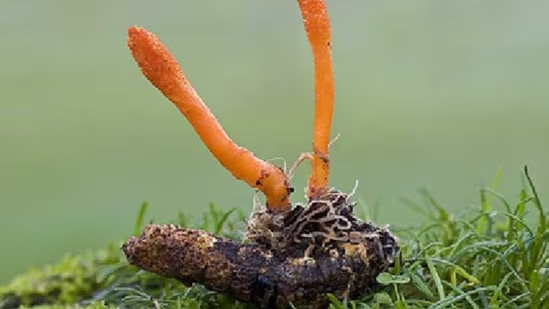15 october 2024 : Imagine a scenario where a voracious fungus takes control of a wriggling caterpillar. The spores invade, filling the caterpillar with thread-like filaments called hyphae. Once the caterpillar succumbs to this invasion, the fungus begins to fruit from its remains, transforming into a caterpillar-shaped mushroom. This eerie scene might seem like the opening act of a zombie apocalypse. But soon, you might find yourself tempted to mix this parasitic fungus into your beverage and enjoy some mushroom coffee. Rest assured, these cordyceps offer more than just a caffeine kick. Traditional Chinese medicine attests to their ability to support kidney health, soothe the lungs, stop bleeding, eliminate phlegm, combat fatigue and cough, and even enhance libido for those struggling with sexual desire.
To date, over 750 cordyceps species have been identified, with at least 35 known for their potential health benefits and medicinal properties. If you’re exploring the advantages of cordyceps, Cordyceps sinensis—known in Chinese as “DongChongXiaCao,” meaning “worm in winter, grass in summer”—should be at the top of your list as it grows on caterpillars.
But can you simply toss this caterpillar fungi into your drink? No, mushroom coffee is a blend of ground mushrooms and coffee beans, creating a rich, nutty beverage. Although some scientists in the UK have criticized it, Harvard Health confirms the health benefits of mushroom coffee, including improved sleep, increased energy, enhanced focus, immune support, and reduced inflammation.
Hollywood’s Influence
While the Chinese have utilized cordyceps for centuries, Western awareness has only recently grown, largely thanks to Hollywood. The “killer fungi” garnered attention through its association with HBO’s hit series The Last of Us, which linked it to a zombie narrative. Before its Hollywood spotlight, cordyceps piqued curiosity during the 1992 Olympics when the Chinese women’s running team shattered world records. Despite testing negative for banned substances, they revealed their intense high-altitude training and use of cordyceps as key to their performance. This revelation sparked significant scientific interest in the performance-enhancing potential of cordyceps.
As of 2009, around 100 research institutions were investigating medicinal fungi, with over 200 factories producing fungal preparations. This number has since surged, with various reputable sources—such as ScienceDirect, Nature, Cleveland Clinic, and the National Institutes of Health—endorsing the benefits of cordyceps.
Since cordyceps (known as “keeda jadi” in Hindi and “yarsagumba” in Tibetan) thrive at high altitudes, finding fresh varieties can be challenging. In India, they are primarily located in the Himalayan regions of Uttarakhand, Ladakh, Sikkim, and Arunachal Pradesh. However, some companies have started cultivating cordyceps in laboratories, producing high-potency fruiting bodies without insect involvement.
Today, cordyceps are available as coffee substitutes, capsules, and oils, and there is increasing demand among sports and wellness enthusiasts in India. The market is growing at a compound annual growth rate (CAGR) of approximately 13%, with expectations for further expansion as more products enter the market and consumer awareness increases.
Founded in 2021 by Richa Jaggi and Shivam Singhee, Awshad was one of the first companies to introduce medical cannabis to India and has pioneered products like Calmashroom, which combines cannabis with cordyceps, and Myndshroom, a brain health supplement featuring cordyceps, lion’s mane, and L-theanine.
While some mushrooms are known for their psychoactive properties, concerns have arisen regarding the legality of medicinal mushrooms and cannabis. Richa Jaggi confirms that all Indian states permit the sale and consumption of medical cannabis and medicinal mushrooms. Ingestible medical cannabis requires a prescription from a certified medical practitioner, whereas all topical products can be sold over the counter. Medicinal mushrooms do not require prescriptions and can be easily purchased as natural health supplements. Awshad’s Myndshroom has received a license from the Food Safety and Standards Authority of India (FSSAI).
If you’re feeling adventurous in the kitchen, you can make a cordyceps smoothie, poach them, sprinkle with salt, and drizzle with sesame oil. You can eat the fruiting body raw— with or without the insect husk— but they taste even better when cooked in pasta, soups, or used as toppings for pizzas and flatbreads.
When purchasing cordyceps, look for the label indicating C. sinensis (with C. militaris being a suitable alternative) and consult a nutritionist or physician regarding the proper usage. That “worm in winter, grass in summer” fungus can offer numerous benefits, but caution is advised.

